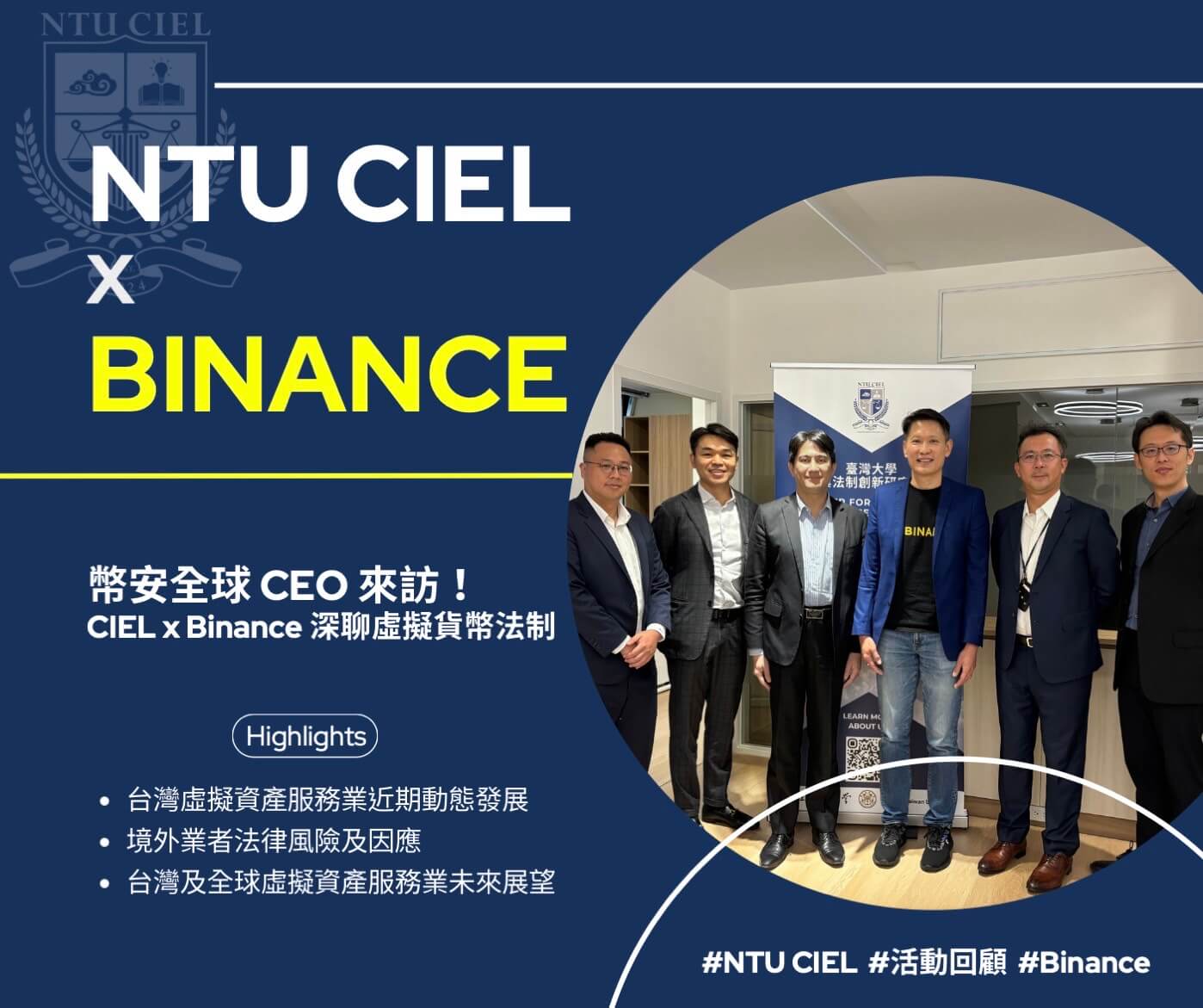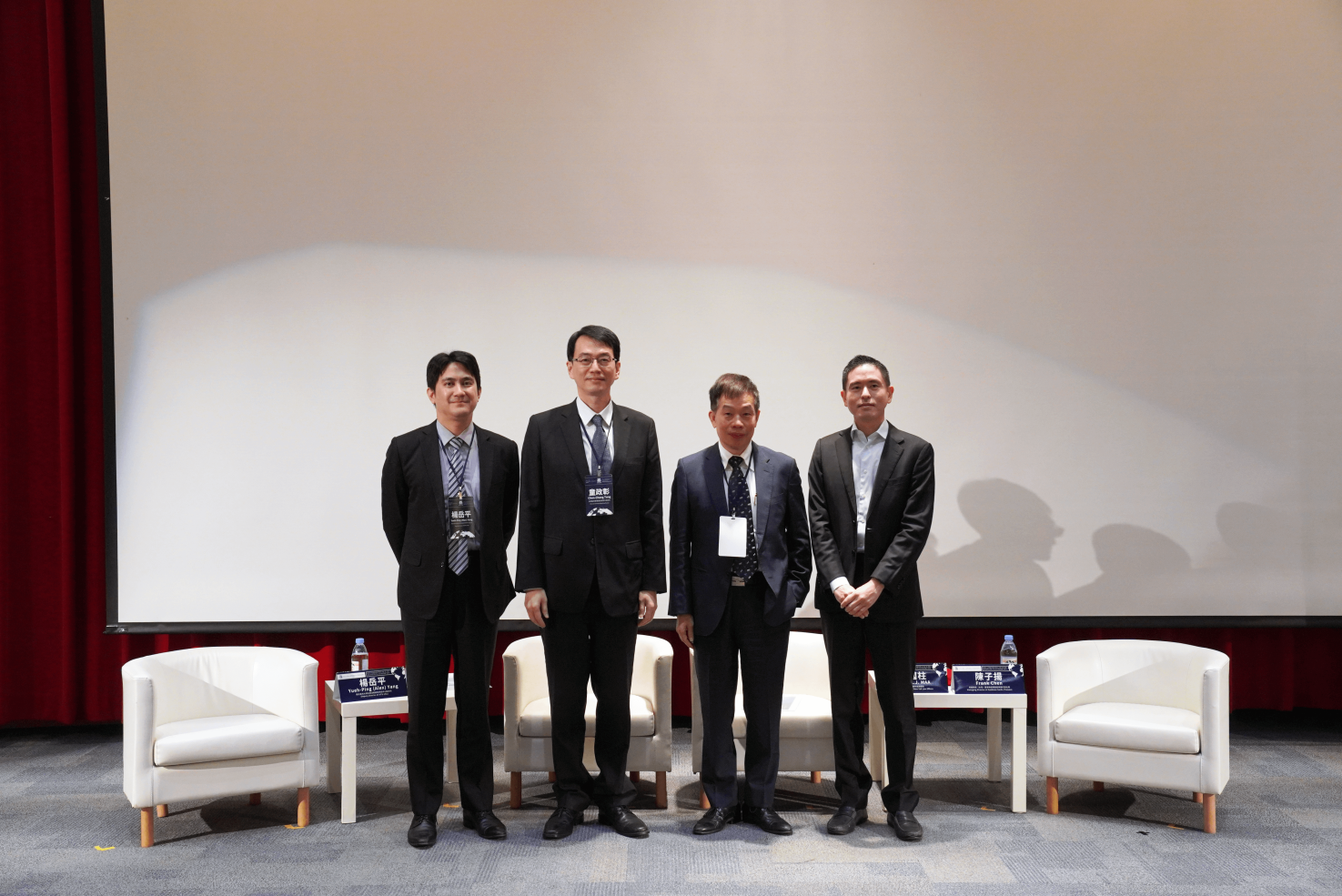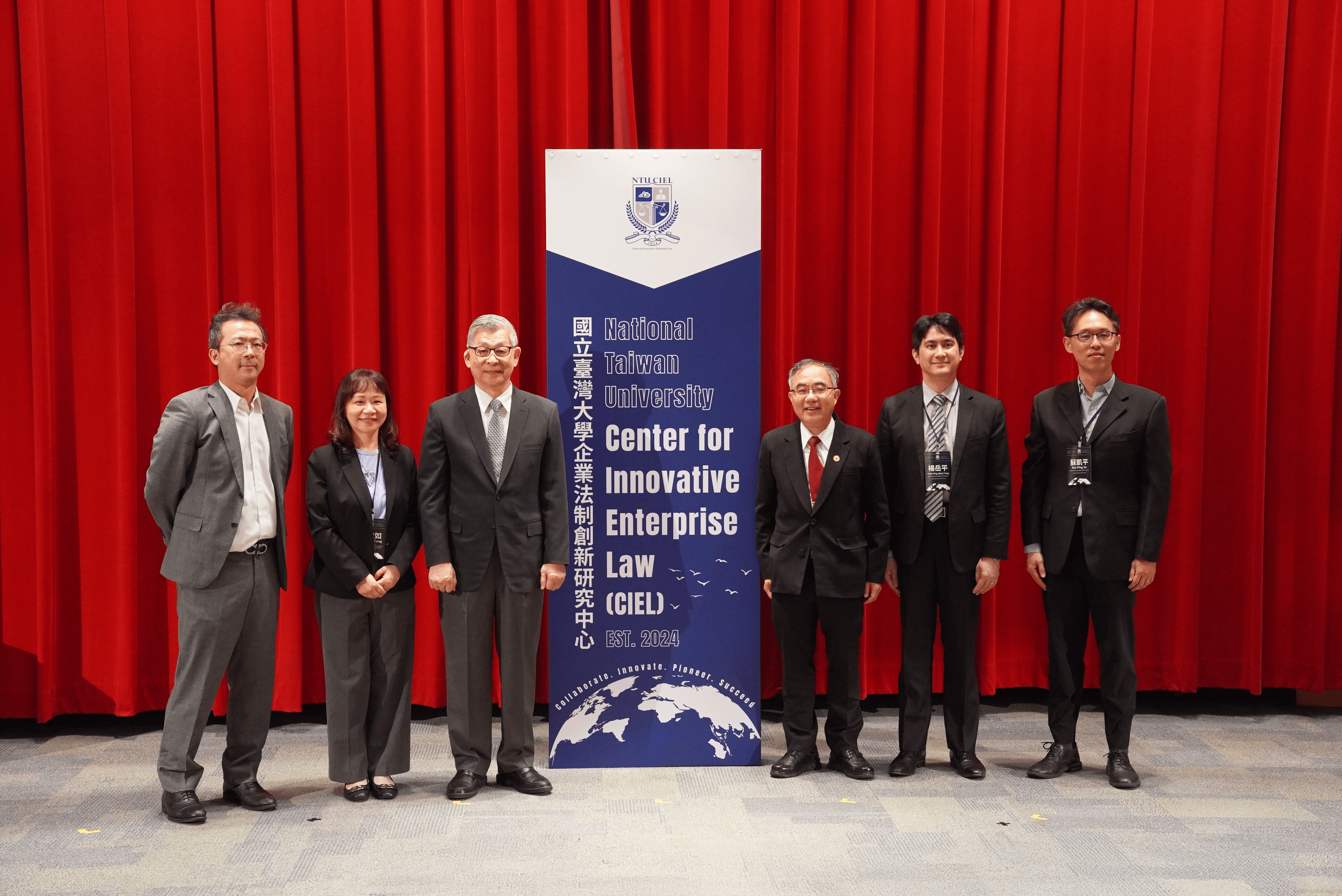文章大綱
NTU CIEL Inauguration Ceremony|Corporate Law in the Era of Geopolitical Economy May 12, 2025 – NTU College of Law, Tsai Lecture Hall, International Conference Hall On May 12, 2025, the Center for Innovation in Enterprise Law (CIEL) at National Taiwan University (NTU) was officially inaugurated at the International Conference Hall of the NTU College of […]
NTU CIEL Inauguration Ceremony|Corporate Law in the Era of Geopolitical Economy
May 12, 2025 – NTU College of Law, Tsai Lecture Hall, International Conference Hall
On May 12, 2025, the Center for Innovation in Enterprise Law (CIEL) at National Taiwan University (NTU) was officially inaugurated at the International Conference Hall of the NTU College of Law’s Tsai Lecture Hall. The inauguration was followed by two compelling roundtable forums that explored the evolving landscape of corporate legal systems in response to geopolitical challenges. As a continuation of our recap of the inauguration ceremony, we now turn to the highlights of the first forum session.
The first roundtable discussion was moderated by CIEL Deputy Director Dr. Chao-Hung Chen and brought together four distinguished legal scholars from around the world:
-
Professor Dan W. Puchniak from Singapore Management University (SMU)
-
Professor Manabu Matsunaka from Nagoya University, Japan
-
Professor Akshaya Kamalnath from the Australian National University (ANU)
-
Professor Pasha Hsieh (謝笠天), also from SMU
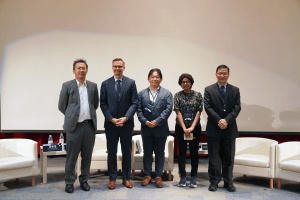
This session focused on “The Impact of the Trump Doctrine on Corporate Governance and Legal Compliance.” Drawing on diverse legal systems and academic backgrounds, the panelists examined the institutional and practical challenges that modern geopolitics pose to global enterprises.
Professor Dan W. Puchniak opened the discussion by framing the topic around three emerging dimensions shaped by geopolitics: Identity, Isolation, and Inspiration.
Under the theme of Identity, Professor Dan noted that corporate nationality, once a relatively clear-cut classification, has become increasingly complex as multinational companies adapt to geopolitical risk by operating across multiple jurisdictions. He used TSMC and TikTok as illustrative cases, showing how factors such as shareholder composition, operational hubs, and board structures can lead to conflicting interpretations of a company’s national identity.
On the topic of Isolation, he observed that the Trump administration’s policies had contributed to an increasingly insular U.S. stance, pushing global supply chains toward regionalization. As a result, distinct regional industrial ecosystems are beginning to operate independently of one another.
Lastly, in discussing Inspiration, Professor Dan argued that while geopolitics has introduced substantial challenges, it also presents opportunities. He emphasized that such conditions compel nations and corporations to reevaluate their strategic positions within the global order from a broader, more regionalized perspective—a shift he believes will become pivotal in both business decision-making and policy design.
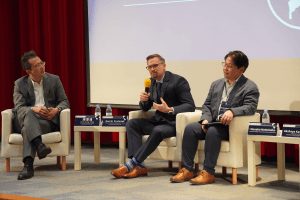
Following that, Professor Manabu Matsunaka offered insights from Japan’s experience. One major impact of the Trump administration on Japan, he explained, was the shift in energy policy. Additionally, Trump’s tepid stance on Diversity, Equity, and Inclusion (DEI) policies created barriers to advancing related initiatives in certain regions. The disparity in regional DEI standards, he noted, presents a regulatory challenge for multinational corporations as they navigate inconsistent compliance frameworks. While Trump’s policies did have negative implications for Japan’s stock market and manufacturing sector, Professor Matsunaka suggested they may also have increased market activity and opened new opportunities for activist shareholders.
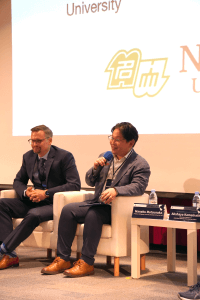
Next, Professor Akshaya Kamalnath shared her perspective, emphasizing that corporations have always been influenced by political forces—today more than ever. She stressed that modern corporate responsibilities and policymaking are not only shaped by governmental pressure but are also increasingly driven by a broad spectrum of stakeholders, including shareholders, employees, consumers, and civil society.

The session concluded with Professor Pasha Hsieh, who highlighted the declining effectiveness of the WTO’s dispute resolution mechanism, exacerbated by the Trump administration’s aggressive tariff policies. This has added layers of uncertainty to the global trade environment. He then reviewed a number of trade and investment agreements between the U.S. and Taiwan—most notably the U.S.-Taiwan Initiative on 21st-Century Trade—and analyzed how similar bilateral and multilateral negotiations, including recent ones between the U.S. and the U.K., could reshape global industrial structures and compliance obligations.
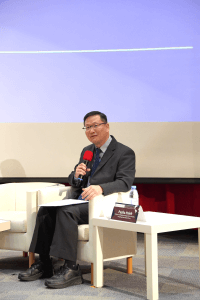
Following the conclusion of the initial round of remarks, the session moderator, Deputy Director Dr. Chao-Hung Chen, posed a key question to the panel: In the face of the various impacts brought about by geopolitical shifts, how should legal systems around the world respond?
In response, Professor Dan emphasized that legal reform should not rely on the wholesale transplantation of foreign legal models, but must instead be grounded in a deep understanding of domestic industrial structures and local contexts. Citing corporate ownership structures as an example, he noted that Western firms are typically dominated by institutional investors, while in many Asian countries such as Taiwan and Singapore, family-owned businesses and state-owned enterprises are more prevalent. These differing governance models naturally lead to very different legal and regulatory needs. He further reiterated that, as supply chains become increasingly regionalized, legal frameworks should be strategically designed and adapted to reflect the unique risks and opportunities within each region.
Professor Akshaya added that just as businesses restructured their supply chains in response to the COVID-19 pandemic, they must now reassess and strengthen their risk management systems and operational models in light of current geopolitical uncertainty.
Building on this, Professor Pasha observed that while legal systems have historically looked to the U.S. and Germany as dominant models, the current geopolitical climate is prompting a greater emphasis on regional legal frameworks. From the perspective of international trade law, he argued that regional trade agreements—beyond those led by the United States—are becoming increasingly vital. Ultimately, he stressed that only legal systems that effectively address real-world issues—such as trade and sustainable development—will wield meaningful influence in shaping global governance.

During the Q&A session, an audience member posed the following question:
Amid increasing geopolitical uncertainty, how should businesses adjust their operational strategies and respond to the evolving regulatory landscape from a corporate governance perspective?
Professor Dan responded by emphasizing that this question extends beyond corporate law itself and touches on the foundational role of the rule of law. Geopolitical shifts, he noted, may fundamentally reshape our traditional understandings and standards of key legal concepts, with corporate identity being a prime example. In this context, businesses must increasingly recognize that political influences on corporate governance are becoming the norm, and should proactively develop adaptive governance mechanisms.
Professor Manabu added that in light of rapidly changing external environments, businesses must adopt jurisdiction-specific governance strategies that are tailored to the policy environments of each country in which they operate.
Professor Akshaya echoed this view, noting that companies will likely come to rely more heavily on regional political ties to ensure the stability and regulatory feasibility of their global operations.
Professor Pasha, approaching the issue from the perspectives of international trade and sustainable development, stressed the importance for businesses to closely monitor developments in trade agreements and to integrate environmental considerations into their business models as part of a more comprehensive compliance and risk management strategy.
At the conclusion of the forum, Deputy Director Dr. Chen posed a forward-looking question:
As corporations increasingly adopt multi-jurisdictional identities, can legal systems effectively respond to and adapt to this emerging trend?
Professor Dan answered that legal frameworks can serve as crucial tools for clarifying corporate identity, particularly in cases where national affiliation and regulatory boundaries are blurred. A well-designed legal mechanism can provide a transparent and legitimate means of determination.
Professor Manabu, drawing on practical experiences from Japan, observed that corporate identity will likely become a latent governance concern, and that proactive legal preparations could mitigate risks arising from such uncertainty.
Professor Akshaya further highlighted the law’s potential to act as a bridge for cross-cultural understanding and institutional alignment, which in turn can enhance the coherence and resilience of corporate governance.
Finally, Professor Pasha emphasized that the influence of international legal regimes on domestic enterprises is growing, and that in the future, corporate compliance behavior will be increasingly shaped by international law and cross-border regulatory standards.

In his closing remarks, Deputy Director Dr. Chen noted that in today’s turbulent geopolitical climate, countries across Asia are facing unprecedented challenges. However, he emphasized that this moment also presents a valuable opportunity to strengthen regional collaboration and deepen transnational connections. Within this context, corporate legal systems are poised to evolve, giving rise to new institutional frameworks and modes of practice.
This concluded the first roundtable session. Sincere thanks to all the distinguished speakers for their insightful contributions and thought-provoking discussions.
For those interested, the content of the next roundtable session is also available on our center’s official website. We warmly invite you to revisit the highlights of the event online!
Back

